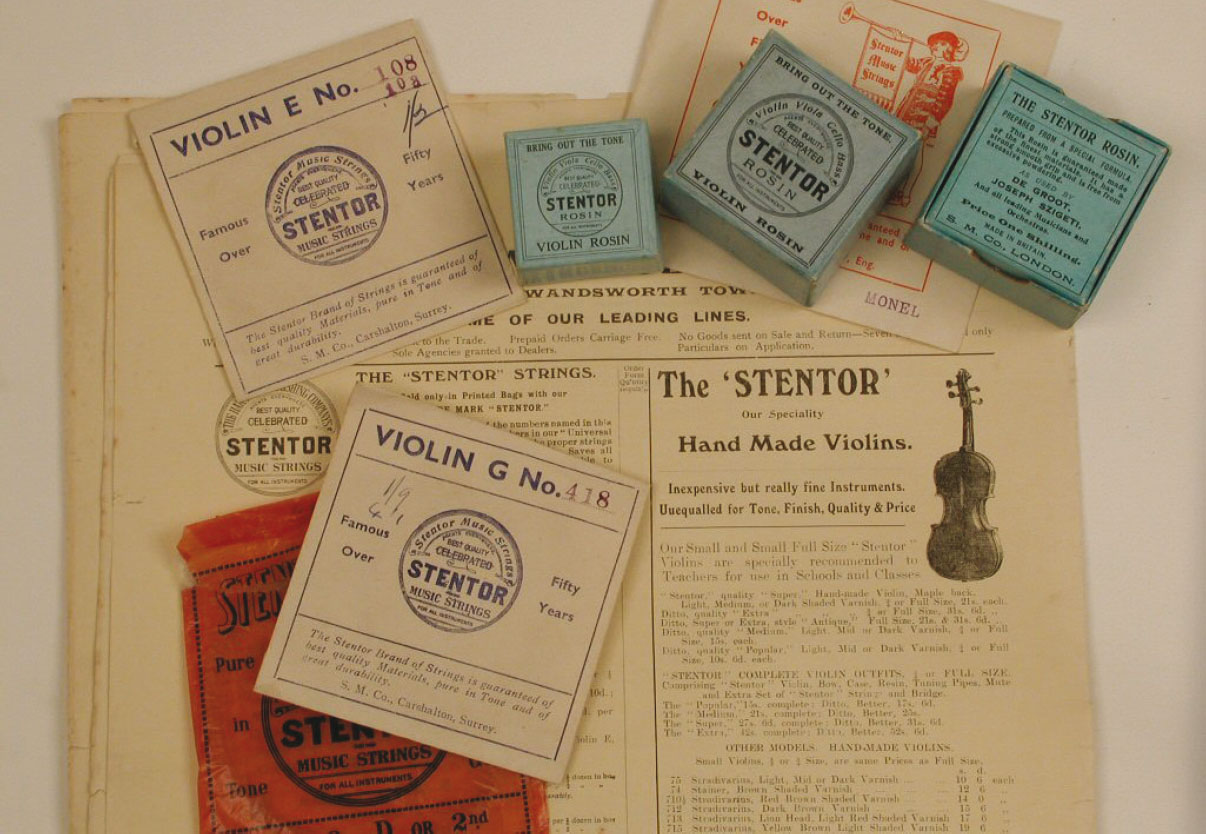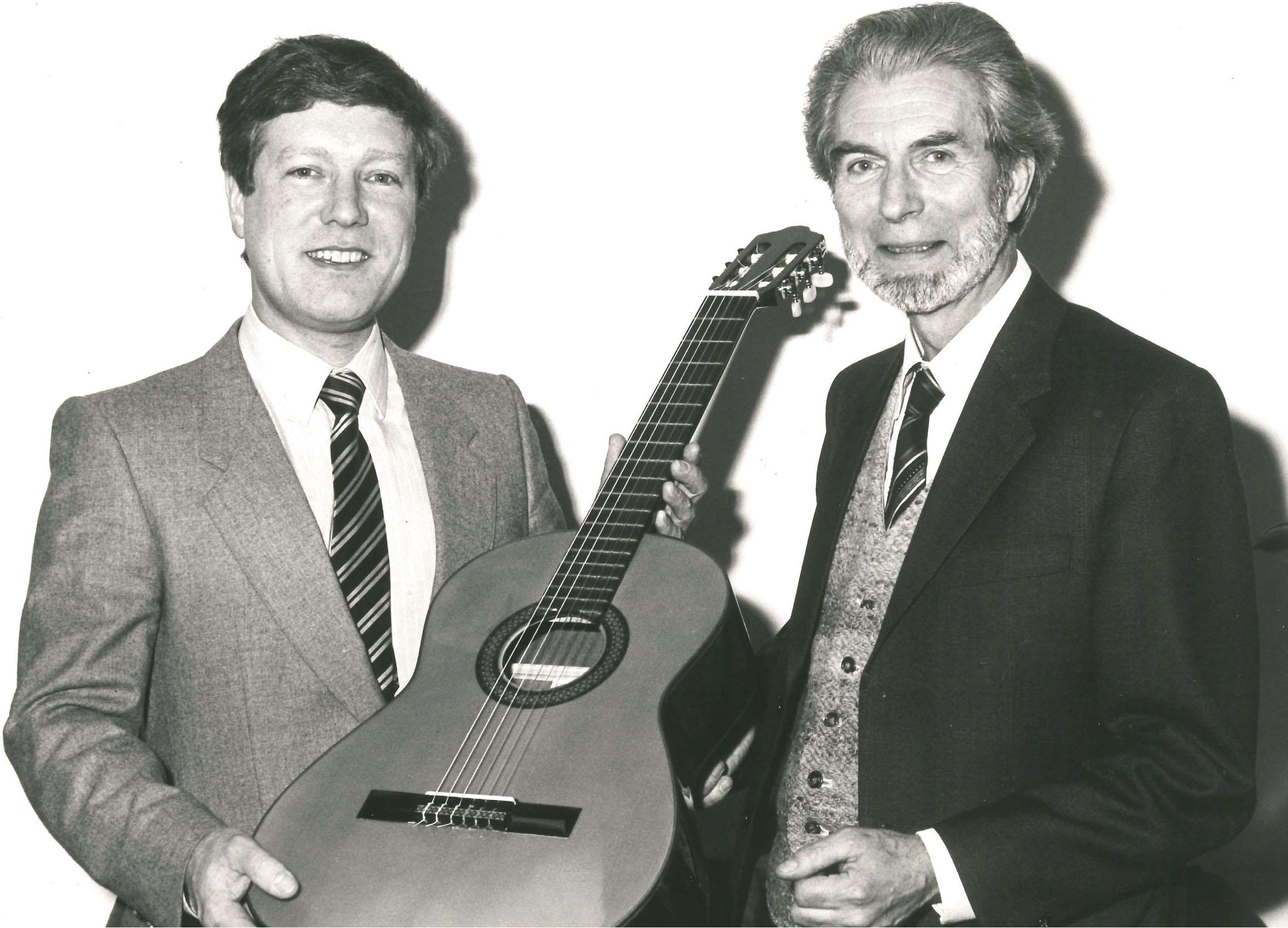
In Greek mythology, Stentor was the herald of the Greek forces in the Trojan War, said by Homer to have a voice as powerful as 50 other men. For more than two million people, Stentor is the brand name of their first-ever instrument, known for its logo of a man in a helmet shouting. And for string teachers across the world, the name is instantly associated with entry-level budget-friendly bowed string instruments.
At the higher end of the strings market, an association with having a ‘stentorian’ voice might not seem appealing, but for thousands of young players who come to the instruments every year, the brand and its quality does just what they need it to, as the company's 125th anniversary this year attests. The milestone also marks it as one of Britain's pioneering global brands and one of the few that is still family run.
The story starts in London back in the late 1800s when violinist, teacher and composer Edward Doughty set up the Harmonic Publishing Company, which eventually moved into shop premises in Wandsworth, the business named Doughty & Co. He registered the Stentor name in 1895 for rosin and gut strings. Around the turn of the century, he started importing violins from Mirecourt, which was then the industrial violin-making capital of France, and subsequently Bubenreuth and Markneukirchen in Germany. He tried out all the instruments himself and sold them as ‘Stentor tested’. The business grew through the 1920s and 1930s, with his son, also Edward, coming on board.
Business suffered during the Second World War and it was only when Edward's 17-year-old grandson Michael came into the company full-time in 1959 that things started to pick up again. Michael's pioneering spirit took him on the road across the UK, developing Stentor as a distributor of entry-level stringed instruments. Michael is now semi-retired but is still active as chairman. Luke Doughty, his son, and great-grandson of the founder, attests to his father's contribution: ‘Michael came into the business as a young man and grew up with it. He started to make the changes and built the business into what it is today.’
Michael's travels took him behind the Iron Curtain, to violin factories in East Germany and Romania, and then further, to China. When he first went in 1978, visitors required invitations and travel was far from simple. (This was even before Isaac Stern's famous ground-breaking visit to China, documented in From Mao to Mozart, in 1979).
Michael was eventually able to get official permission to have violins made and exported to the UK – in those days all business with China had to go through state-owned companies. One of the key issues in the 1980s was quality control, and training the makers was a crucial part of business trips. Luke explains: ‘My father realised early on that quality was the difficult part. In those days the policy of the Chinese government was to move the violin factory workers on into other jobs, making machine parts, for example, and to move new workers into the jobs at the violin factory.’

‘Inexpensive but really fine instruments’ has been a longstanding company motto
And so eventually, Michael decided to set up his own factory in Taixing, which opened in October 1995 – 25 years ago to the month – one of the first UK companies to sign a licence as a ‘Wholly Foreign Owned Enterprise’. This gave the staff more stability and a chance to develop. As the country continued to open up to foreigners, Western luthiers would come and advise, while Chinese makers could travel abroad to learn about lutherie, leading to continual improvement.
Quality control is no longer an issue, but there are undoubtedly stereotypes about how factory instruments actually sound, especially in fractional sizes. Luke is aware of the criticisms: ‘Our mantra hasn't changed since the beginning – to produce best-selling and high-quality instruments at an affordable price. We do that well and the proof is in the pudding. Over the years we've sold between two and three million violins and we supply thirty countries across the world regularly. People make assumptions about the quality of these instruments, but the reality is that sound is subjective and people hear with their eyes. If you want to buy an instrument you can spend an awful lot of money.’
Jonathan Pamplin, from Thwaites, which sells and rents out the basic models, describes the value of Stentor's instruments: ‘They're the best of the “cheap and the cheerful”. That's what they do. I don't know any players who don't begin on one. We don't sell anything in the same price range – the most expensive Stentor we sell is around £200 and then the jump to other brands is to £350. They come with a case and a bow, as well, so you don't need to pay for those.’ Another factor is that they're nigh-on indestructible, ‘They last forever,’ says Pamplin.
There may be cheaper instruments available, but they are not worth buying, especially for the environmentally aware. Luke says, ‘There's a violin being sold online for £40 which says it's made of solid wood with an ebony fingerboard. That's not possible. It's either not made of solid wood and you'll see that when you buy it, or it's being subsidised – and where did the ebony come from?’ Stentor only uses sustainable materials – for example hardwood and ebony from recognised sources.
The next step up from the ‘Student’ instruments are the ‘Conservatoire’ instruments (Luke says, ‘We have students on them as far as Grade 8 and beyond, but in general at that stage they'll buy a more expensive instrument, an Arcadia or an old instrument’). At the highest level are instruments with Italianate names such as ‘Messina’, ‘Elysia’ and ‘Arcadia’. The expense generally correlates to better-quality fittings, specially chosen wood and varnish, and more hand finishing. The top ranges have their own section in the factory, with the best technicians taking their pick of the wood stores.
The company strives to improve its instruments continually, ‘We've done a lot of testing where we string up twenty instruments, they're all played and two people make a sound assessment using our own system with five points of interest. Then we feed back the information,’ explains Luke. The points of interest include playability (response), projection (loudness) and warmth (fullness of tone).
One of the most important factors to the sound is the strings themselves, which are provided in the initial kit, and they are part of the testing process: ‘We've done a lot of comparisons between strings – we string up 20 instruments with each type of string and try to make a comparison to see which one proves the best quality of sound,’ says Luke.
Always on the look out for improvements, the company has also created its own varnish, and invested in P&H bow company, which allows it to sell bows that teachers can rehair themselves, to save them being thrown out. Michael worked together with various makers, dealers and teachers to develop special viola sizes, including at the smaller end, and the company has developed its own double bass shape.
And what of the future? The business is sensitive to changes in music education policy, as Liz Wilkes, marketing director and daughter of Michael Doughty explains: ‘We talk to teachers and go to events like the Music Education show so we can keep in touch with the latest developments, and we're a member of ESTA so we can talk directly to teachers. It's constantly changing. There was more group teaching 15 years ago and then it changed and now it's coming back, but there's not so much government funding, so music hubs and schools are having to save money and music is having to fight for its place on the curriculum.’
They also have to keep up with trends, she says: ‘We need to keep looking ahead to the future and being flexible. Music is constantly changing, fashions change. Folk was a big trend a few years ago and that's tailed off.’ They also look to new markets, for example in the Middle East and South America, and during lockdown business remained strong, unlike in so many other areas, with an increase in interest from people looking to learn an instrument.
The company had plans for its anniversary year, which began at NAMM in February, where Luke and Liz picked up the Milestone Award. Celebrations were due to have included a concert of pieces written by the original Mr Doughty. Covid put paid to that for now, but it can't dampen the pride that the family takes in the business. Luke says, ‘The three words Stentor has always tried to adhere to are consistency, quality and affordability. That's a phrase my great-grandfather wrote in a pamphlet more than a hundred years ago. That's what we always strive to do.’

Michael Doughty presents a Lorca guitar to Cyril Cork, as part of a competition run in conjunction with Music Teacher, March, 1984








